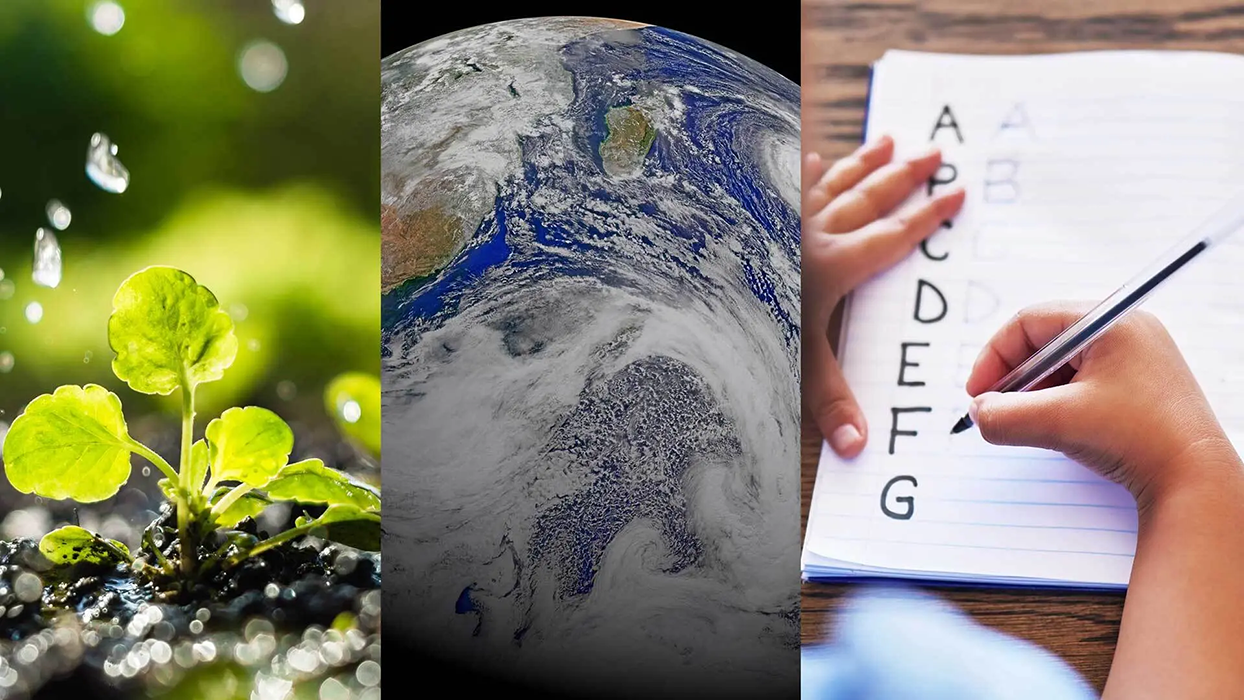
Faculty from the School of Public Health will receive unprecedented funding to tackle some of society's biggest challenges, including a $3M grant to create an international alliance focused on alleviating food, energy and water insecurity, protecting environmental and global public health and bolstering community resilience in a changing climate.
The Grand Challenges Grants Program is the largest and most comprehensive grant program of its type ever introduced at the University of Maryland and represents an institutional-wide effort to tackle major societal issues, including climate change, educational disparities, artificial intelligence and sustainability. The School of Public Health received 11 grants to address issues of pandemic preparedness, water quality, social justice and more.
"I am extremely proud of our Grand Challenges Grants Program award winners,” said Dean Boris D. Lushniak. “As these projects focus on the big public health issues, it reiterates the importance and impact of our school and faculty in finding solutions to enduring and emerging societal issues. I look forward to following the progress of our award winners and their university collaborators."
A total of 50 Grand Challenges Grants representing 185 faculty members and over $30M in institutional investments were awarded in four categories:
- Institutional Grants: Winners receive $3 million over 3 years
- Impact Awards: Winners receive up to $500,000 over 2 years
- Team Project Grants: Winners receive up to $1.5 million over 3 years
- Individual Project Grants: Winners receive up to $150,000 over 3 years
Amy Sapkota - MPower Professor of environmental health and director of the CONSERVE Center of Excellence - is the primary investigator for one of the three Grand Challenges Institutional Grants awarded. Her UMD-based “Global FEWture Alliance: Transformative Food-Energy-Water Solutions to Ensure Community Resilience in a Changing Climate” acknowledges that our vital resources of food, energy and water are inextricably linked.
“When each of these systems are managed in isolation, it can unintentionally lead to the collapse of the others,” she said. “Instead of addressing food, energy or water challenges individually, we must work across disciplines to develop holistic technology-based and policy solutions that focus on all three areas of what we call the ‘food-energy-water nexus.”
Sapkota and her interdisciplinary team will develop and implement these solutions both in Maryland and with partners in Israel, Nepal and Tanzania. The Global FEWture Alliance will also focus on capacity-building and experiential education.
Team members include:
- Dina Borzekowski, research professor, Department of Behavioral and Community Health and director, Global Health Initiative
- Rachel Rosenberg Goldstein, assistant professor, Maryland Institute for Applied Environmental Health (MIAEH)
- Rianna Murray, assistant research professor and graduate director, MIAEH
- Amir Sapkota, chair, Department of Epidemiology and Biostatistics
- Leena Malayil, assistant research professor, MIAEH
- Shirley Micallef, associate professor, Plant Science and Landscape Architecture and Center for Food Safety and Security Systems
- Stephanie Lansing, professor, Environmental Science and Technology
- Gili Marbach-Ad, director, CMNS Teaching and Learning Center, research professor
- Xin-Zhong Liang, professor, Atmospheric and Oceanic Science
- Jennifer Cotting, director, Environmental Finance Center
- Allen Davis, professor, Civil and Environmental Engineering
- Tomer Malchi, executive director and co-founder, CultivAid, Israel
- Yael Mishael, associate professor and director, Center for Sustainability, Hebrew University of Jerusalem
- Clive Lipchin, director, Center for Transboundary Water Management, Arava Institute, Israel
- Biraj Karmacharya, director, Public Health/Community Programs/Global Engagement, Kathmandu University, Dhulikhel Hospital, Nepal
- Shree Krishna Dhital, executive director, Sanskriti Farms and Research Center, Israel
- Thurka Sangaramoorthy, professor, American University and Addis Ababa University, Ethiopia
The School of Public Health faculty also received three Impact Awards, four Team Project Grants and three Individual Project Grants.
Impact Awards
- Pandemic Preparedness Institute - Primary Investigators (PIs): Cynthia Baur, endowed chair and director, Horowitz Center for Health Literacy, and Brooke Fisher Liu, professor, Communication. Sandra Quinn, professor and chair of the Department of Family Science; Stephen B. Thomas, professor, Department of Health Policy and Management, and director, Center for Health Equity; et al.
- Urban Equity Collaborative - PI: Willow Lung-Amam, associate professor, Urban Studies and Planning. Co-PI: Devon Payne-Sturges, associate professor, Maryland Institute for Applied Environmental Health; et al.
- Maryland Institute for Digital Accessibility - PI: Jonathan Lazar, professor, Information Studies. Elizabeth Aparicio, assistant professor, Department of Behavioral and Community Health and Shannon Jette, associate professor, Department of Kinesiology; Sara Olsen, Ph.D. ’22; et al.
Team Project Awards
- Water Emergency Team: Community-Driven Rapid Response to Sanitary Sewer Overflows, Household Backups and Environmental Contamination - Co-PIs: Rachel Rosenberg Goldstein, assistant professor, Maryland Institute for Applied Environmental Health and Marccus Hendricks, associate professor, Urban Studies and Planning, director of the SIRJ Lab.
- Encuentros: A University-Community Partnership to Mitigate the Mental Health Crisis for Latino Immigrant Youth - PI: Amy Lewin, associate professor, Department of Family Science; Co-Pi: Kevin Roy, professor, Department of Family Science; et al.
- The Maryland Safe Drinking WATER Study: An Initiative to Protect Drinking Water in Underserved Communities - PIs: Rianna Murray, assistant research professor, Maryland Institute for Applied Environmental Health and Leena Malayil, assistant research professor, Maryland Institute for Applied Environmental Health; Co-PIs: Amy Sapkota, MPower Professor of environmental health and director of the CONSERVE Center of Excellence and Paul Turner, associate professor, Maryland Institute for Applied Environmental Health; et al.
- Anti-Black Racism Initiative - PI: Jeanette Snider, assistant research professor, Sociology; Co-PI: Craig Fryer, associate professor and interim chair, Department of Behavioral and Community Health; et al.
Individual Project Grants
- Promoting Youth Mental Wellbeing in Rural Honduras by Engaging Teachers as Catalysts - PI: Ghaffar Hurtado Choque, assistant professor and extension specialist, Department of Family Science
- Genetic and Lifestyle Risk Factors of Accelerated Brain Aging in Severe Mental Illness - PI: Tianzhou Ma, assistant professor, Department of Epidemiology and Biostatistics
- AFTER: A Hospital Violence Intervention Program For Youth Victims of Gunshot Injury - PI: Rabiatu Barrie, assistant professor, Department of Family Science
